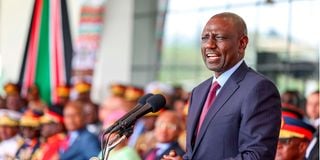Premium
President Ruto: I have no control over factors compounding cost of living

President William Ruto addresses the nation from Uhuru Gardens in Nairobi during Jamhuri Day celebrations on December 12, 2023.
President William Ruto has said that factors exacerbating the high cost of living are beyond his control.
In a joint media interview on Sunday evening, Dr Ruto said Kenyans will have to wait a while "for the dollar/shilling rate to improve".
"There is no miracle that is going to happen. We live in a global economy. The price of fuel is not controlled by the Kenyan government. It is controlled by the producers. I promised in the context of where we are. If things remain constant, I would have fulfilled my promise (to stabilise the dollar)," Dr Ruto said.
The government, Dr Ruto said, had to take very difficult and painful decisions, but "it is better to take these decisions today than to put Kenyans in debt distress".
He said he knew before he was elected that it wouldn't be easy.
"For your information, I knew it would be difficult. I am not surprised," he said.
The price of fuel, the president said, was not determined by his government but by external factors.
He also insisted that the price of fuel in Kenya was the same as in Uganda and Tanzania "because we buy fuel from the same producers".
The President also claimed that while he had reduced the Road and Rail Development Levy and two other taxes, the price of fuel was set by producers and influenced by other global changes.
On the runaway cost of living and the skyrocketing dollar, President Ruto said: "The issue of the exchange rate is a factor of many aspects. I came into office when there was a serious situation caused by Covid-19, a major war in Europe and a major drought caused by climate change. All these factors combined to create a global situation that increased the price of the commodities we import".
He explained that the US Federal Reserve had raised interest rates from 0.25 to 5.25 per cent. This, he said, was the highest interest rate in its history.
"Every country has tried to increase liquidity, but they have increased inflation. Ours was close to double digits. What the world has been doing is managing liquidation."
According to the head of state, Kenya was only maintaining an artificial exchange rate that was flattering.
He was referring to the rate of one dollar to Sh130, and that the government was spending Sh206 billion to prop up the Kenyan shilling so that it didn't fall to the real exchange rate. But this was unsustainable, he said.
His regime, he said, had reduced the levy on imports of products that could be made in the country and focused on exports. He added that the government was "importing Sh500 billion worth of food items from cooking oil to maize, rice and so on".
In his view, Kenyans - and the government in general - have not paid enough attention to agriculture, resulting in the skyrocketing cost of living.





